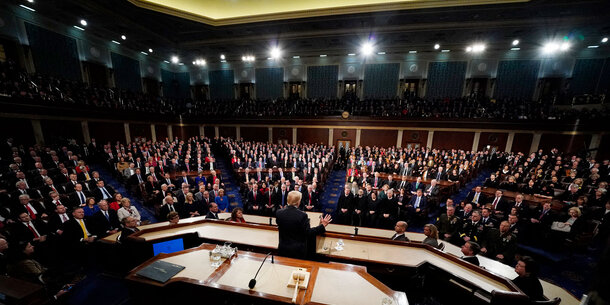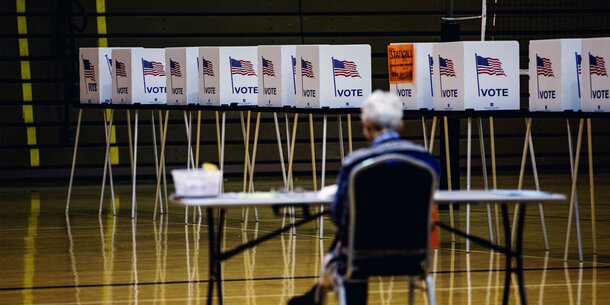Rani Dasi, a U.S. citizen whose roots in North Carolina stretch back nearly two decades, has cast a ballot in at least 20 elections without incident. But her right to vote, along with hundreds of thousands of voters in the state, is now at risk after the Justice Department filed a federal lawsuit which may wrongly remove eligible voters like her from the rolls. On Tuesday, Dasi and others went to court to fight back.
When she registered to vote in 2007, Dasi provided the requested identification. Yet she landed on a list of thousands of voters with allegedly incomplete registrations — a problematic list that has been recycled in multiple investigations and lawsuits challenging voters’ eligibility over the last two years. These efforts come amid ongoing unfounded claims of significant voter fraud — which in fact does not exist.
The latest effort came in May, when the Trump administration sued the North Carolina State Board of Elections. Now Dasi and seven other individual voters, the League of Women Voters North Carolina, and the NAACP North Carolina State Conference are asking the court to be allowed to join the lawsuit to protect their rights. They are represented by the Brennan Center, Forward Justice, and the Southern Coalition for Social Justice.
The lawsuit’s claims parallel those from an unsuccessful challenge that followed the 2024 race for a seat on the North Carolina Supreme Court. The Trump administration alleges that board officials violated the 2002 Help America Vote Act, a federal law enacted after the 2000 election, by using a voter registration form that doesn’t make clear a voter must provide either a driver’s license number or the last four digits of a Social Security number to register. The lawsuit also alleges that the state’s voter registration database violates federal law because it does not contain one of these numbers or a unique ID number for each voter.
Since 2004, the North Carolina voter registration form has included a prompt for voters to provide either a driver’s license number or the last four digits of their Social Security number. However, for several years before 2023, the form did not make clear that providing one of these numbers was mandatory for virtually everyone.
A missing number in a voter’s record does not mean that the voter is unlawfully registered or even that the voter did not provide those numbers upon registration. In fact, most of the voters asking to join the case provided this information when they registered. These numbers appear to be missing from their registration files due to a clerical or technical error, which is no fault of their own — or because they registered before the Help America Vote Act required that information.
The Justice Department’s lawsuit is the latest in a long line of attempts to exploit mistakes to exclude North Carolina voters from the democratic process. In 2023, a complaint filed with the state board of elections — the first to use a list of more than 200,000 voters with allegedly incomplete registrations — prompted officials to revise the form to clearly indicate the requirement to provide a driver’s license or Social Security number if the applicant has one.
Over the last two years, that list of 200,000 voters, which includes the people filing in court this week, has become the basis for complaint upon complaint. Before the 2024 election, the Republican Party filed a federal lawsuit seeking to remove these voters with allegedly incomplete registrations from the rolls. That suit is pending. Following the 2024 election, the losing candidate in the North Carolina Supreme Court race attempted to toss tens of thousands of legally cast votes, claiming that certain voters, including those with allegedly incomplete registrations like Dasi, shouldn’t be on the rolls. That postelection dispute, which lasted for six months, ended when a federal court ordered the election be certified.
Now, the Trump administration is demanding that a federal court compel the board to identify and contact voters who allegedly lack this information and ask them to provide it again. While the administration doesn’t specify how many North Carolina voters lack this information, court filings suggest that at least 200,000 — the same amount cited by the 2023 complaint and 2024 GOP lawsuit — could be affected. And while the lawsuit doesn’t say what should happen to voters whom the state board cannot reach or have a separate issue with their registration, as our motion to intervene explains, “the consequence of demanding the timely addition of supposed ‘missing’ information and a certification of ‘full compliance’ is clear: those voters must be removed from the rolls.”
It seems the administration is picking up exactly where the state supreme court postelection dispute left off.
If the court sides with the administration in the new case, eligible voters could unknowingly be removed from the voter rolls. For the organizations that we represent, it would mean undertaking expensive and time-consuming efforts to contact affected voters, such as helping voters contacted by local election officials navigate the requirements, creating new educational materials, and working alongside officials to find existing records.
The court should let their voices be heard in this case.



